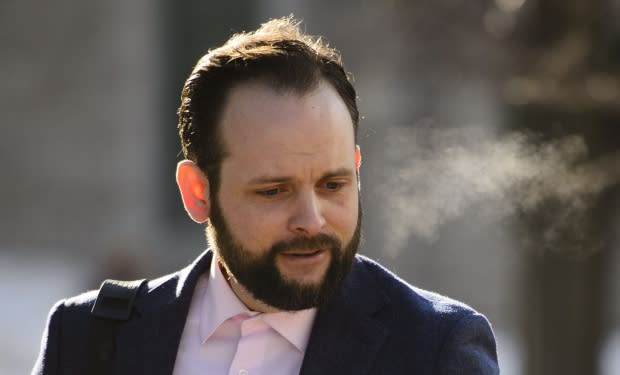Former hostage Joshua Boyle's trial likely suspended — potentially for years
The trial of former hostage Joshua Boyle has been adjourned until Friday, by which time his estranged wife's lawyer is expected to have filed an application that could suspend the Ottawa case for years and open up the possibility of a Jordan application.
Boyle, 35, has pleaded not guilty to 19 charges, including assault with a weapon, sexual assault and forcible confinement, and is being tried by a judge alone. Most of the charges involve his estranged wife, Caitlan Coleman.
Boyle was charged a few months after the couple returned to Canada in October 2017 with the children they had while being held captive for five years in Afghanistan and Pakistan.
On April 17, Ontario court Judge Peter Doody ruled that Boyle's defence can introduce evidence that he and Coleman engaged in "prior acts of consensual anal intercourse, consensual vaginal intercourse from the rear, sexual acts involving ropes and consensual biting as acts of sexual play." Doody added the evidence would be general in nature and not include significant details about any one act.
That same day, Coleman's lawyer, Ian Carter, told court he planned to ask the Supreme Court for permission to challenge Doody's ruling. Canada's Criminal Code contains several "rape shield" laws that prevent the defence from using emails, medical records or an alleged victim's past sexual history to prove a pattern of sexual behaviour. The court can make an exception if the accused proves their relevance.
Carter also said he planned to ask Doody for a stay of the ruling at a hearing Wednesday, to give the Supreme Court time to consider the challenge.
Caitlan Coleman's lawyer explains why he's challenging the judge's ruling:
Decision possibly 36 months away
But on Wednesday, Carter told court that after further research, he plans to file a certiorari application with Ontario Superior Court instead, either later Wednesday or first thing Thursday, which will automatically suspend the trial while the Superior Court reviews Doody's ruling and decides whether or not to quash it.
A tentative hearing date in Superior Court has been set for mid-May, Carter added.
Once a Superior Court decision is made, Carter could decide to appeal to the Ontario Court of Appeal. He could then also seek leave to appeal the Ontario Appeal Court's decision to the Supreme Court.
In court Wednesday, Doody said that if the matter passes through all three courts, a decision on whether the evidence can be heard could come more than 36 months from now, citing recent court statistics.

One of Boyle's defence lawyers, Eric Granger, told court that any delay in the case would represent a "serious prejudice" to Boyle, who must endure the "continued deprivation of his liberty" under strict bail conditions, including ankle bracelet monitoring that Boyle pays for himself on a monthly basis.
Outside court, Granger said it's "premature" to say whether the defence team plans to file a Jordan application, arguing Boyle's right to a trial in a reasonable timeframe has been violated.
"Obviously, delay is what the Jordan decision speaks to. Obviously, we'll have to see what happens from here," he said.
Eric Granger, one of Boyle's lawyers, says he's concerned about the delays:
'We'll move as quickly as possible'
Doody adjourned the trial until Friday morning, telling court that if Carter hasn't filed the application by then, Coleman's cross-examination is expected to continue.
My client's interest is in preventing being cross-examined in these highly sensitive areas. If I wait until after the fact, it's too late. - Ian Carter, Caitlan Coleman's lawyer
Asked about the trial delay outside court Wednesday, Carter said his obligation is to his client.
"My client's interest is in preventing being cross-examined in these highly sensitive areas. If I wait until after the fact, it's too late. The horse is out of the barn, and she's got no remedy. She will have been cross-examined," he said.
"We've got an extraordinarily quick hearing date for this appeal of May 15th, and we'll move as quickly as possible."
18-month timeframe
To avoid unnecessary delay, Doody ordered he be notified within two working days of the decisions made in any court with respect to Carter's application, and has asked that all three teams of lawyers write him a letter around the first day of each month, starting in June, about any steps that have been taken to set court dates.
Doody told court he wants a written record of the progress made each month in case Boyle's defence files a Jordan application. In Ontario court, the reasonable length of a trial has been set at 18 months.
Doody noted that prior to Carter's application, they had been on track to complete the trial within that window.
Earlier in the trial, Coleman testified Boyle "felt he had a right" to have anal sex with her, hit her on one occasion when Coleman refused it and threatened to leave him with their children, and then left her tied up after promising to untie her following vaginal sex.
On another occasion, she testified, she consented to what she thought would be vaginal sex with him on her hands and knees, struggled against Boyle when he tried to have anal sex with her, and that eventually "he stopped and he hit me in the face and he said, 'F--k you.'"
Boyle's other lawyer, Lawrence Greenspon, has meticulously dissected Coleman's allegations during cross-examination, which was put on hold last week.
Some past coverage of the trial:

